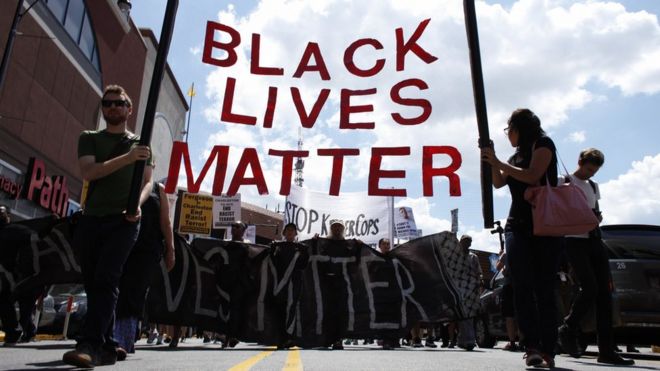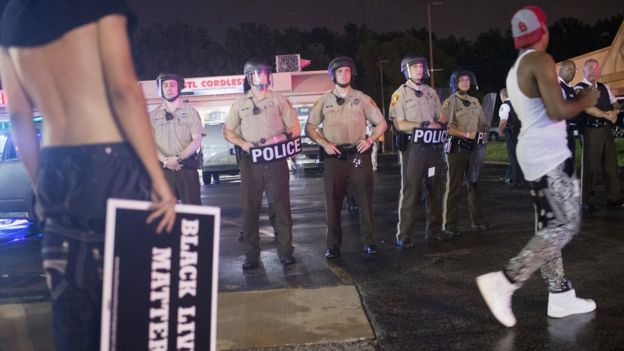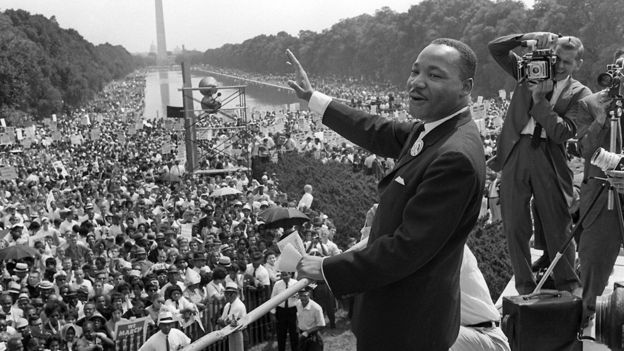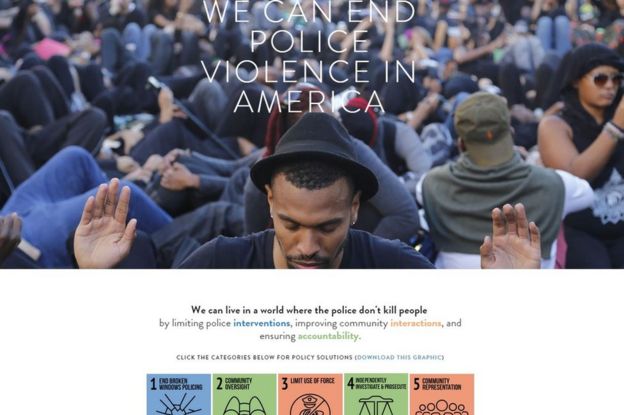
- 14 September 2015
- US & Canada
 Getty Images
Getty Images
Conservative American politicians and television pundits have increased their attacks on the Black Lives Matter movement. In the aftermath of the killing of police officers, the movement's name has been mentioned as a contributing factor. A look at the Black Lives Matter backlash.
"They're a hate group. And I'll tell you right now, I'm going to put them out of business."
That's what Fox News TV host Bill O'Reilly said after showing a clip of protestersin St Paul, Minnesota, holding a Black Lives Matter banner and chanting, "Pigs in a blanket, fry 'em like bacon." O'Reilly said the chant meant "dead police officers".
The protest happened the day after Harris County Deputy Darren Goforth was shot to death by a black male suspect in Houston, Texas. In a news conference after the killing, Sheriff Ron Hickman told reporters, "We've heard 'black lives matter.' All lives matter. Well, cops' lives matter, too."
Several pundits ran with Hickman's sentiment linking the movement to violence against police, and Republican party politicians like Ted Cruz said protest movements in Baltimore and Ferguson were vilifying law enforcement and "endangering the safety and security of us all".
"Their agenda is it's OK to go ahead and kill cops," said Fox's Kimberly Guilfoyle.
In an official statement from the Black Lives Matter Movement, the group denounced these conclusions.
"We're targeting the brutal system of policing, not individual police," the statement reads. "We seek a world in which ALL Black lives matter, and racial hierarchy no longer organises our lives or yours. This is a vision of love. As Black survivors of White supremacy, our hearts go out to all victims of violence."
 Getty Images
Getty Images
The "black lives matter" phrase and hashtag was born in 2013 after the acquittal of George Zimmerman in the killing of Trayvon Martin. The movement grew and spread after the deaths of Eric Garner in New York and Michael Brown in Ferguson, Missouri. Today there are 26 chapters of Black Lives Matter around the country. There have been over 1,000 Black Lives Matter demonstrations around the country.
From the start, there has been opposition. Some of the trouble began just with the name, as some have interpreted it as a declaration of supremacy. Presidential candidates have stumbled over this point - former Maryland governor Martin O'Malley ultimately apologised after telling a group of protesters, "Black lives matter. White lives matter. All lives matter."
The New York Times editorial page recently came to the group's defence. "They are not asserting that black lives are more precious than white lives," they write.
"They are underlining an indisputable fact - that the lives of black citizens in this country historically have not mattered, and have been discounted and devalued."
Deana Rohlinger, a professor of sociology at Florida State University, says some of the tactics that BLM has used - interrupting campaign speeches, shutting down major traffic thoroughfares, using controversial chants - have been used by countless other protest movements dating back to the 1960s, and don't inherently correlate with a desire for lawlessness.
For examples, as a recent article in Vox pointed out, the Kennedy administration once worried that Martin Luther King Jr's famous March on Washington in 1963 would devolve into a "race riot".
 Getty Images
Getty Images
"This is a stereotype, that activists are engaged in violence, activists being people who don't want to work...It becomes shorthand way of stereotyping a cause and those who are trying to push it forward," she says. "Historically people without power use disruption. Black Lives Matter is not doing anything differently than other movements have."
Creating what she calls a "false dichotomy" between supporting BLM and supporting police also makes perfect fodder for TV.
"It makes good press. Pundits are having fun, so are some of the politicians," she says. "It really creates this false dichotomy for them. 'Republicans care about the police. We're the ones who care and Black Lives Matter does not,' which is not true but it gets listeners. It rallies troops."
Still, violence and lawlessness has occurred at protests in Ferguson and Baltimore. ("Protests are messy," writes Vox.)
And while the movement has founders - Alicia Garza, Patrisse Cullors and Opal Tometi - and figures of prominence, Black Lives Matter does not have a traditional top-down leadership structure.
David Klinger, a former police officer and professor of criminology at University of Missouri-St. Louis, says that should not absolve Black Lives Matter of culpability when violence does occur at the fringes of the group. He says it is impossible to say with total certainty that those who act violently are not influenced by things they pick up from Black Lives Matter rhetoric, and that those who chanted "pigs in a blanket" could cause real harm.

"The leadership should immediately disown them and say, 'You are persona non grata,'" he says. "The heated rhetoric that goes over the top, that's where it becomes a problem if you don't have unity of command and sound leadership that can - pardon the pun - police the efforts of their group."
They may not have centralised leadership, but Harold Pollack, a professor at the University of Chicago School of Social Service Administration, said he was very impressed with the recently released demands for action laid out by Campaign Zero, which was founded by prominent activists like Deray Mckesson, Johnetta Elzie and Brittany Packnett, who've participated in many Black Lives Matter events.
The campaign lists 10 potential solutions to police misconduct, such as ending ticketing quotas, requiring body cameras and making police officers'disciplinary histories public. Pollack believes explicitly stated demands like these can help the movement coalesce around concrete goals and avoid being generalised as a "hate group".
"Many elements included were solid policy proposals that could command broad support," says Pollack. "I hope they do more of that. I fear that in the absence of a positive agenda that we're one killing of a police officer away from a very harsh backlash."
For what it's worth, Lecia Brooks, director of outreach for the Southern Poverty Law Center - which designates and tracks hate groups - has no intention of adding Black Lives Matter to their list.
"We're very much concerned about the killing of police officers," she says. "That said, Black Lives Matter is not on our radar."
No comments:
Post a Comment